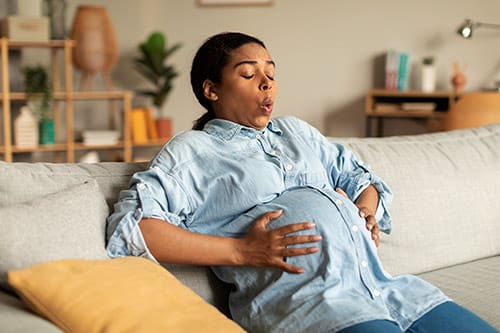
As your due date nears, it can be challenging to determine what’s just gas and what’s a contraction. Are you in labor, or are those bean enchiladas just not sitting right? Keep reading to learn how to know if that strange feeling in your belly is your baby telling you they’ll arrive soon or simply your lunch causing trouble. In other words, is it just gas or labor pains?
Remember that you should always connect with your doctor if you’re unsure, particularly if you are encountering any type of new discomfort or pain. Every woman experiences pregnancy differently, so if something just feels “off,” call your doctor or midwife for advice. This is especially advised if you’re less than 37 weeks pregnant or your pregnancy is considered high-risk.
So, it’s difficult to decide if the discomfort in your tummy is just routine or if your baby is saying she’s ready to enter the world.
Here are 5 questions to ask yourself to figure out if it’s gas or labor pains:
1. Are you having other issues?
With labor, much more will be going on “down there.” Change in vaginal discharge or bloody mucus increases the chance that it’s labor and not a false alarm. Usually, vaginal discharge is white, but by the ninth month of pregnancy, it can be of a different color and may change in texture and consistency.
It’s normal to have pinkish or slightly blood-tinged discharge at the end of pregnancy. You may also notice the loss of your mucus plug (which protects the cervical opening). Once this happens, you can safely assume labor is a few days away.
If you don’t notice any other symptoms of labor besides abdominal pain, your discomfort is more likely to be due to gas or another digestive issue.
2. Are the pains happening on a schedule?
The contractions that labor involves usually develop a rhythm. Women in labor will feel the contractions every four to five minutes, and the pains become increasingly stronger.
On the other hand, gas comes and goes on an irregular schedule. Plus, gas pains are usually sharper, while early labor contractions feel more like harsh period cramps. Our tip? Get out a stopwatch and see if your pain happens at regular intervals. If it doesn’t, and the pain is continual, it’s more likely to be gas than labor pains.
3. What have you eaten lately?
Since your baby is squeezing your digestive system, any food can cause gas. Beans, cauliflower, and broccoli are prime culprits for filling your belly with gas. If you find that your gas pains continue, think about removing gas-inducing foods from your diet until after you deliver.
4. Does your belly feel tight?
Labor pains include a big muscle contraction all down your abdomen, coming from your uterus. There’s an uncomfortable tightening sensation in the stomach during labor, and your entire stomach will feel hard. If your stomach stiffens every time you experience pain and softens afterward, it’s probably a contraction.
On the other hand, gas pains just cause a bloated feeling in your stomach, but your muscles won’t tighten in intervals. Does your stomach feel harder every time you’re experiencing pain? Then, it’s probably the start of labor contractions, not gas.
5. Can you get relief?
Usually, gas pains get much better quickly once you go to the bathroom or pop an antacid. So if a trip to the lady’s room helps, it’s a sign that your baby will stay put for a little longer.
Gas or Labor Pains?
One of the most common (but pretty embarrassing!) symptoms of pregnancy is farting. Due to the release of hormones like relaxin during pregnancy, your muscles is unable to hold in gas as well as it did pre-pregnancy. You may find that you let one slip, no matter how hard you try to keep it in.
Sure, contractions may feel like gas, while gas may feel like contractions. However, you’ll feel bloated if you have gas, while contractions will cause muscle tightening across your belly. The pain will likely continue until you pass gas, while contraction pain will be recurring. Contractions generally last 30-45 seconds in early labor and follow a schedule, occurring every 5-15 minutes.
Our pregnancy articles are for information only and shouldn’t be used to diagnose or create a treatment plan. Always ask your doctor for advice about any questions or issues you may have during your pregnancy.
If you’re wondering how your baby is growing, make sure to check out this realistic video, “Life Before Birth.” This six minute video is a great way to learn how a baby develops during pregnancy.
Editor’s Note: This article was originally published on March 11, 2016, and has since been updated.
